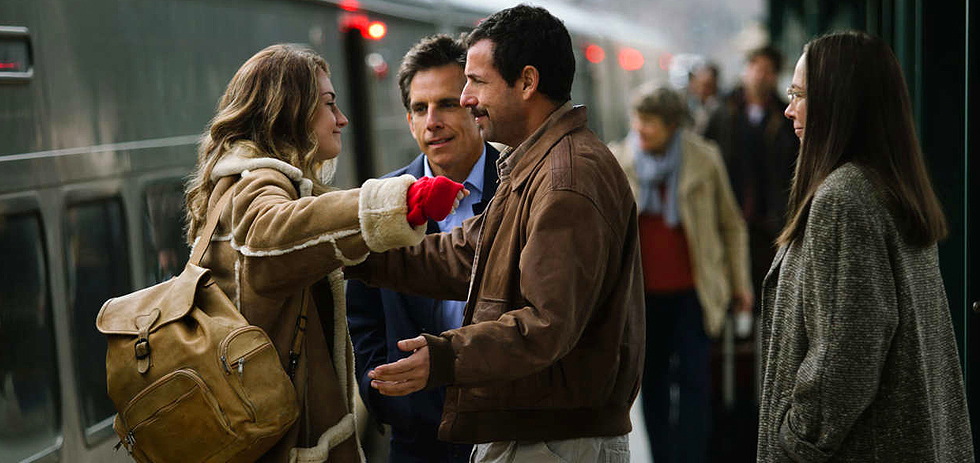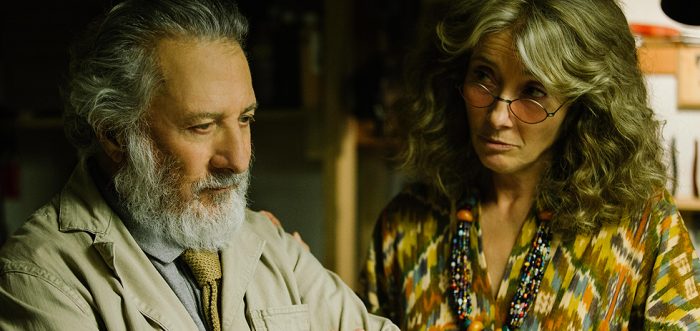
Split families. Urban malaise. Feelings of inadequacy. None of this is new territory for Noah Baumbach, whose comic-dramatic character studies like The Squid and the Whale, Greenberg, Margot at the Wedding and Frances Ha have all mined the everyday anxieties and existential crises of (predominately white, middle-class) urban America. But with The Meyerowitz Stories (New and Selected), Baumbach revisits these themes with a heightened level of maturity and warmth, resulting in a deftly-handed ensemble comedy that approaches the likes of Albert Brooks and Elaine May in its blend of the hilarious and heartbreaking.
The Meyerowitz family is made up of disparate parts that gravitate around a central core: Harold Meyerowitz (Dustin Hoffman). A sculptor and retired Bard faculty member who lives in a book-laden Manhattan townhouse with his fourth wife, the charming alcoholic Maureen (Emma Thompson), Harold is father to three adult children: Danny (Adam Sandler) and Jean (Elizabeth Marvel), from an earlier marriage, and their slightly younger half-brother Matthew (Ben Stiller), from a different marriage. (The exact order of wives is unclear; there was an annulment somewhere in the mix.) Matthew, the most well-off and “well-adjusted” of the bunch, is the clear favourite; Harold uses his name as his computer password, as well as for the title of one of his most beloved sculptures. Danny and Jean can’t help but feel inferior.
Success, in all its relative, subjective mind-fuckery, is a shared source of fixation in the family, especially among the men. Harold constantly compares his success as an artist with that of his contemporary, L.J. Shapiro (Judd Hirsch). Harold’s major achievements include having one prominent public sculpture, “Gilded Halfwing”1, and the fact that one of his artworks was acquired by the Whitney Museum (where it sits in storage). L.J., on the other hand, is the subject of a major retrospective at MoMA. Harold attends the opening, but his comparative obscurity quickly propels him to bolt out the door. Unemployed, soon-to-be-divorced house husband Danny, too, feels like a failure, despite his success as a father to Eliza (Grace Van Patten), who is commencing her filmmaking studies at Bard. And LA-based Matthew, despite his professional success as a “personal wealth” consultant, has trouble in his domestic life, his relationship with his wife and young son strained by his frequent absence.

The film is separated into the “new and selected” stories of the title, punctured by snappy intertitles. The stories are chronological, but sometimes leap unexpectedly to a different time and place. They operate like chunks of collective memory that don’t belong to any particular family member, with the camera maintaining an outsider perspective. That said, when Harold suffers a brain injury that lands him in hospital, the film zeroes in, focusing on the three siblings as they keep close watch over their father. This provides the emotional core of the narrative, and for a while the film turns into a hospital hangout movie of sorts. The claustrophobic sibling squabbles and frustrations that ensue do start to become exhausting, but Baumbach is a filmmaker drawn to exhausting, grating, ugly behaviour — Margot at the Wedding and Greenberg in particular showed us this much. The difference here is that it’s softer, and not so toxic.
It’s also very funny. Moving away from the Gerwig-driven, youthful screwball humour of Frances Ha and Mistress America, Baumbach’s screenplay ventures more into observational comedy, with a side dose of broad slapstick (it does star Adam Sandler, after all). The lead cast all deliver performances that excel in bringing both emotional depth and humour to their respective roles, but it’s Sandler who really stands out. His Danny is a sweet sad-sack with a short fuse, who can convincingly switch — in the space of a second — from nostalgically reminiscing over a song on the car radio with his daughter to a road rage-induced swearing fit.
And yet, despite Baumbach’s accomplishment, the fact that Netflix holds the film’s global rights could mean The Meyerowitz Stories becomes one of the first Cannes competition titles to be denied a traditional theatrical release. Meyerowitz was financed and shot independently, with the Netflix distribution deal signed during post-production, and — as Baumbach stressed during the film’s Cannes press conference — the film was made with the big screen in mind. Indeed the cinematography, courtesy American Honey DP and Baumbach first-timer Robbie Ryan, has a smooth, bright, and almost Rohmer-like quality that demands proper projection. It’s a film of superior craftsmanship, and one of Baumbach’s strongest to date. It would be a real shame were it not to be seen as intended.
